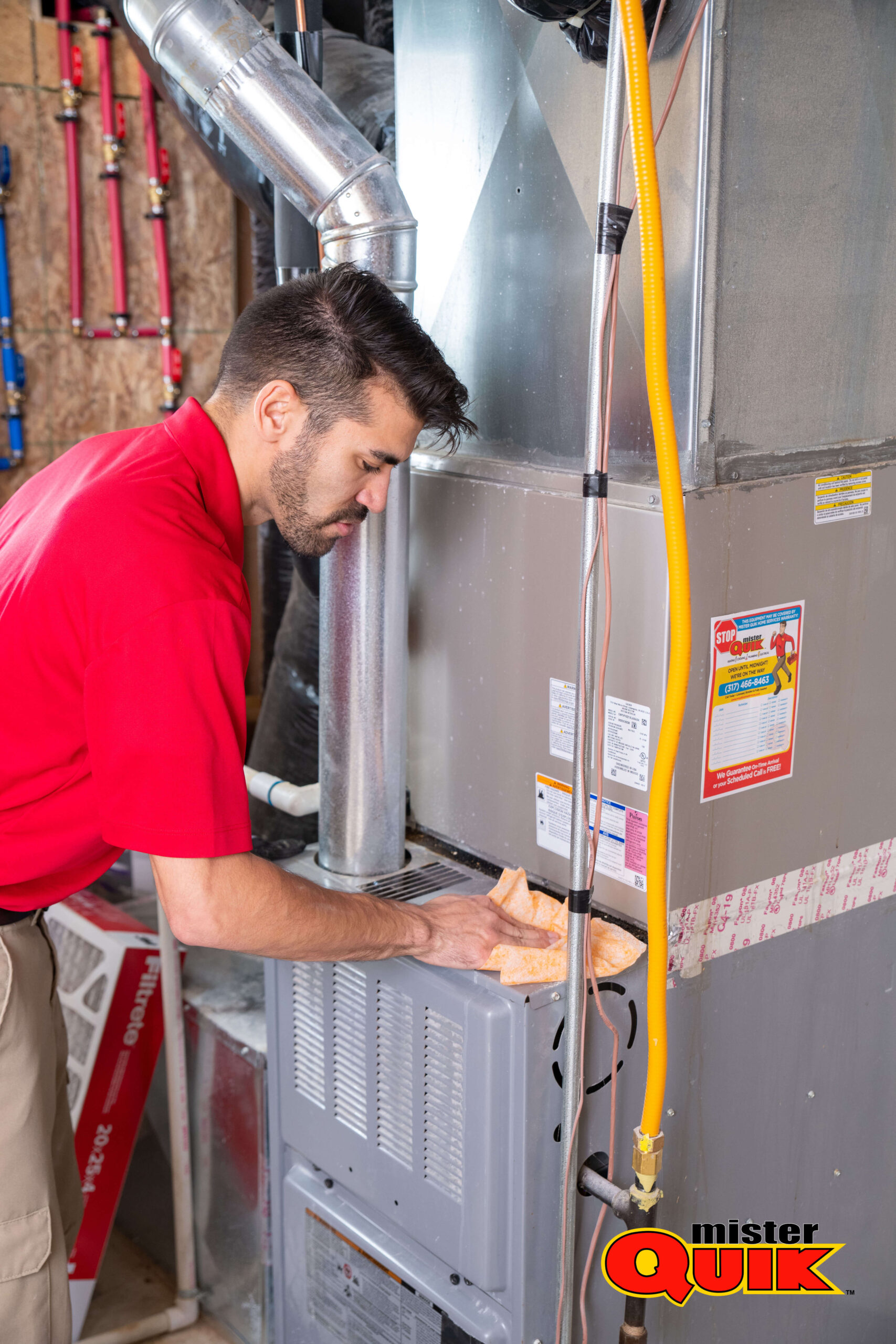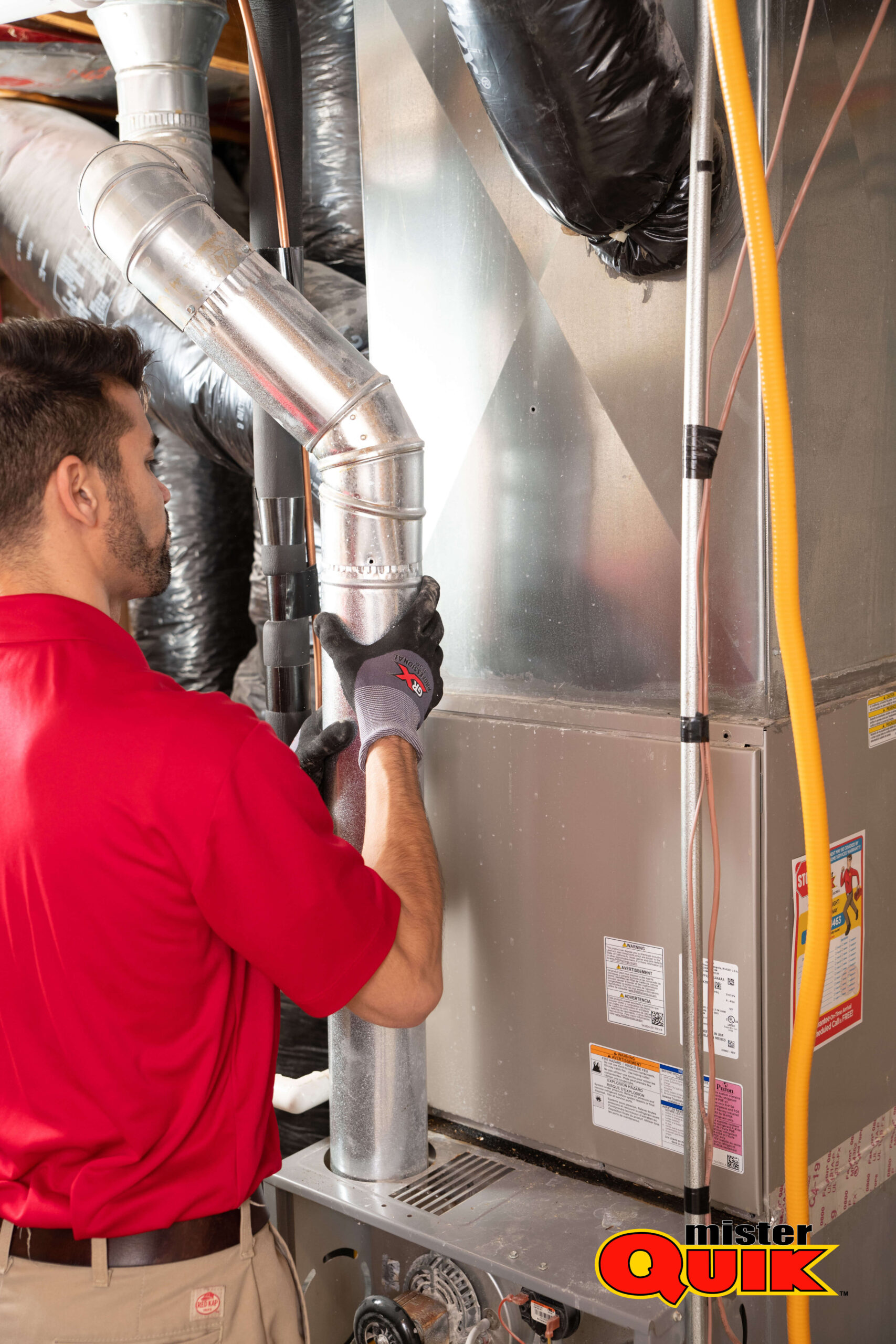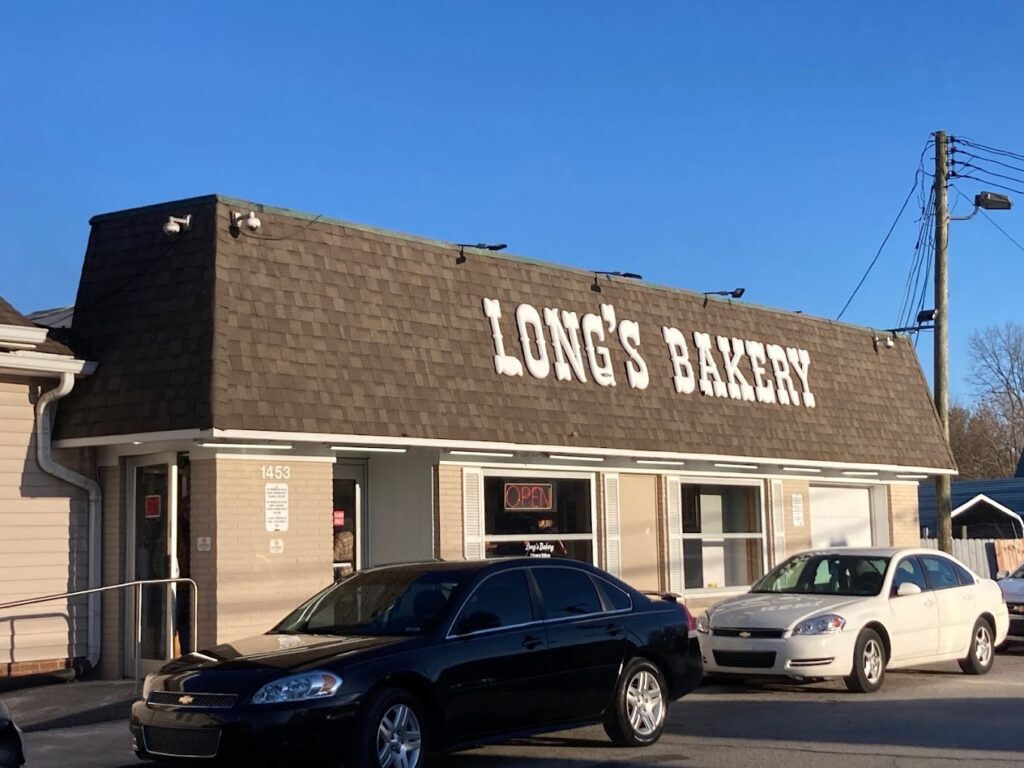Air Handlers in Indianapolis
Schedule on your own without making a call. Click the button below to get started!

What Does an Air Handler Do?
An air handler is a crucial part of your home’s heating, ventilation, and air conditioning (HVAC) system. It works tirelessly behind the scenes to ensure your indoor air quality remains comfortable and healthy. Here’s a simplified breakdown of what an air handler does:
- Air Circulation: The air handler circulates conditioned air throughout your home, ensuring consistent temperatures in every room.
- Filtration: It contains filters that trap dust, pollen, and other particles, improving indoor air quality and reducing allergens.
- Humidity Regulation: Some air handlers can regulate humidity levels, keeping your home comfortable year-round.
- Heat Exchange: In the winter, the air handler helps distribute warm air generated by your furnace or heat pump.
- Cooling Distribution: During hot months, it circulates cool air produced by your air conditioner.
In essence, your air handler acts as the heart of your HVAC system, ensuring that your home remains comfortable and healthy regardless of the weather outside.
What Does an Air Handler Look Like?
If you’ve ever wondered what an air handler looks like, you’re not alone! An air handler is a vital part of your HVAC system, responsible for circulating air throughout your home. Let’s take a closer look at what it is and how it functions.
An air handler is typically located indoors, often in a utility closet, attic, or basement. It consists of several components, including a blower motor, evaporator coil, air filter, and housing unit. The housing unit encloses the other components and is usually made of metal to ensure durability and longevity.
At the heart of the air handler is the blower motor, which powers the circulation of air. It pulls air from inside your home, passes it over the evaporator coil to cool or heat it (depending on the season), and then distributes it back into your living spaces through ductwork.
The evaporator coil is a series of coils that contain refrigerant. As air passes over these coils, heat is absorbed or released, depending on whether your HVAC system is in cooling or heating mode. This process helps regulate the temperature of the air before it's circulated back into your home.
Another essential component of the air handler is the air filter, which helps remove dust, pollen, and other airborne particles from the air. It's essential to regularly replace or clean the air filter to maintain good indoor air quality and prevent the air handler from becoming clogged.
In general, most HVAC systems will last 10 to 15 years, but depending on the type of system and other contributing factors, that estimate can be highly variable.
Replacing an air handler costs between $10,00 to $15,00, including the unit and installation.
If air isn’t circulating properly inside your home or you notice hot and cold spots in some of your rooms, the fan might not be working at all. The fan could also be making strange noises, which indicates that something is wrong and your air handler needs to be inspected. Blower motor failure.:
The difference between a furnace and an air handler is that a furnace creates heat while an air handler moves air. They are two different pieces of HVAC equipment.
Yes, Technically. Not advisable. Cost — While it’s cheaper at the time to just replace part of the system, if you have to make repairs on the part you didn’t replace or end up replacing the 2nd part at a later date it will end up costing more than if would have to replace the entire system.
How Long Should an Air Handler Last?


An air handler is a critical component of your HVAC system, so knowing how long it should last is important for keeping your home comfortable. Here’s what you need to know:
On average, an air handler can last anywhere from 10 to 15 years with proper maintenance and care. However, several factors can affect its lifespan, including the quality of installation, usage patterns, and environmental conditions.
Proper installation is key to ensuring the longevity of your air handler. A qualified technician, like those at Mister Quik Home Services in Indianapolis, can install your air handler correctly, ensuring it operates efficiently from the start.
Regular maintenance is also essential for prolonging the life of your air handler. Routine inspections and tune-ups can help identify and address any issues before they escalate into major problems. This includes cleaning or replacing air filters, checking refrigerant levels, and lubricating moving parts.
Additionally, your usage patterns can impact how long your air handler lasts. If your HVAC system is frequently running or experiencing heavy usage, it may wear out more quickly than one that’s used less often.
Lastly, environmental factors such as humidity levels and air quality can affect the lifespan of your air handler. High humidity can lead to corrosion and rust, while poor air quality can cause dust and debris to accumulate within the system, both of which can reduce its efficiency and lifespan.
Signs You Need to Replace Your Air Handler
Is your home feeling less comfortable than usual? It might be time to consider replacing your Indianapolis air handler. Here are some signs to watch out for:


If your air handler is over 10-15 years old, it might be reaching the end of its lifespan. As air handlers age, they become less efficient and more prone to breakdowns. Replacing an older unit can improve energy efficiency and save you money on utility bills.


Have you been calling for repairs more often than usual? Constant breakdowns and repairs can be a sign that your air handler is on its last legs. Instead of pouring money into repairs for an old unit, investing in a new Indianapolis air handler from Mister Quik Home Services could save you money in the long run.



If your air handler is making unusual noises such as banging, rattling, or squealing, it could indicate mechanical problems or worn-out components. Ignoring these noises could lead to further damage and costly repairs. A new air handler can provide quieter and more efficient operation.



Have you noticed an increase in dust, allergens, or indoor air pollution? An aging air handler may struggle to effectively filter and circulate air, leading to poor indoor air quality. Upgrading to a new air handler can improve air filtration and create a healthier home environment.
Preventative Maintenance for Air Handlers
Preventative maintenance for Indianapolis air handlers is like giving your heating and cooling system a regular check-up to keep it in tip-top shape. It’s all about staying ahead of problems before they become big headaches. Here’s what it involves:
1. Regular Inspections
Our expert technicians will inspect your air handler thoroughly to catch any issues early on. They’ll look for things like worn-out parts, loose connections, or signs of wear and tear.
2. Cleaning and Lubrication
Regularly replace air filters to maintain good airflow and prevent dust and debris from clogging the system. Clogged filters can strain the A/C unit, leading to decreased efficiency and potential malfunctions.
3. Filter Replacement
Dirty filters can restrict airflow and make your system work harder. We’ll replace old filters with fresh ones to ensure proper airflow and improve indoor air quality.
4. Tightening Connections
Loose electrical connections can be a fire hazard and cause your system to malfunction. Our technicians will tighten all connections to keep your air handler safe and reliable.
5. Testing and Calibration
We’ll test your thermostat and other controls to make sure they’re working correctly. If necessary, we’ll calibrate them to ensure accurate temperature readings and efficient operation.
By scheduling preventative maintenance for your Indianapolis air handler with Mister Quik Home Services, you can avoid costly repairs, improve energy efficiency, and prolong the lifespan of your system. Plus, you’ll have peace of mind knowing that your home will stay comfortable all year round.
Reasons to Have an Air Handler
An air handler plays a vital role in your Indianapolis home’s heating, ventilation, and air conditioning (HVAC) system. Here are some reasons why having an air handler is essential:
The air handler helps circulate and filter the air in your home, removing dust, pollen, and other allergens. This promotes cleaner and healthier indoor air, which is especially important for those with allergies or respiratory issues.
Air handlers distribute conditioned air throughout your home, ensuring consistent temperatures in every room. They also help maintain optimal humidity levels, preventing issues like dry skin or mold growth.
Modern air handlers are designed to operate efficiently, helping you save on energy bills. By circulating conditioned air effectively, they reduce the workload on your HVAC system, leading to lower energy consumption.
Depending on your needs, air handlers come with various features such as variable-speed motors, programmable thermostats, and zoning capabilities. These features allow you to customize your indoor environment for maximum comfort and efficiency.
Air handlers can be integrated with different HVAC systems, including traditional split systems, heat pumps, and ductless mini-splits. This versatility makes them suitable for a wide range of homes and heating/cooling setups.
Many air handlers are designed to operate quietly, ensuring minimal disruption to your daily activities. This is particularly beneficial for bedrooms or living spaces where noise levels matter.
By following these steps and seeking professional assistance when needed, you can effectively address an air conditioning emergency and ensure your home stays cool and comfortable, even during the hottest days of summer.
Troubleshoot Checklist:
Check air vents for blockages
Inspect air filters for dirt or clogs
- Ensure thermostat settings are correct
- Check for any obstructions around the air handler.
- Verify humidity settings on the thermostat
- Check for leaks or condensation around the air handler.
- Listen for unusual sounds coming from the air handler
- Inspect the blower motor and fan for signs of wear or damage
- Check for refrigerant leaks in the cooling system
- Inspect the heating elements for proper functionality.









